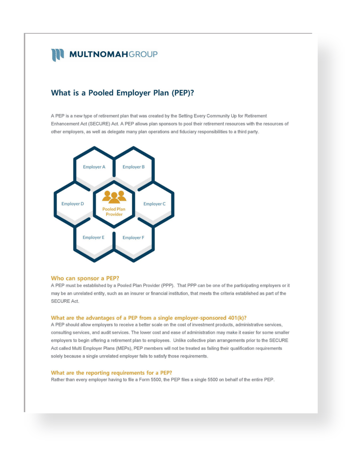Frequently Asked questions
A PEP must be established by a Pooled Plan Provider (PPP). That PPP can be one of the participating employers or it may be an unrelated entity, such as an insurer or financial institution, that meets the criteria established as part of the SECURE Act.
A PEP should allow employers to receive a better scale on the cost of investment products, administrative services, consulting services, and audit services. The lower cost and ease of administration may make it easier for some smaller employers to begin offering a retirement plan to employees. Unlike collective plan arrangements prior to the SECURE Act called Multi Employer Plans (MEPs), PEP members will not be treated as failing their qualification requirements solely because a single unrelated employer fails to satisfy those requirements.
Rather than every employer having to file a Form 5500, the PEP files a single 5500 on behalf of the entire PEP.
Generally, fiduciary responsibility for a PEP will be established in such a way that the fiduciary duty for the administration and investments of the PEP have been outsourced to the PPP who then may allocate responsibilities further to third-parties.
However, each employer still retains certain fiduciary duties:
Any employer participating in a PEP should not have risk related to fiduciary breaches unless the employer fails to take action to terminate its participation in a PEP when they determine that the PEP, PPP, or related fiduciaries are no longer appropriate within the program.

To download a copy of our PEP FAQ, fill out the form to the right.
Fill out the form below to receive
a copy of our FAQ.
© 2025 Copyright Multnomah Group Inc.